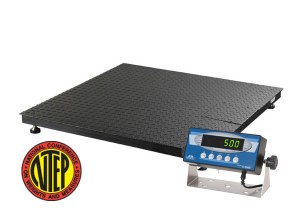There are a number of questions we get from time to time regarding legal for trade scales. Often, especially with floor scales we are asked “why should I buy a scale that is “Legal-for-Trade” when I don’t intend to use it in a commercial weighing setting”?
Defining a commercial weighing application can sometimes be a little tricky. Scales can be moved around and get used for things that maybe you didn’t originally intend.
Basically, an NTEP approved device is required any time money changes hands based on a scale’s reading. We sometimes call this legal for trade scales or we might call it NTEP certified equipment.
Freight scales, for example, must be NTEP approved. For these situations government requires that a scale must pass tests put forth by the National Type Evaluation Program (NTEP). These regulations are meant to protect the consumer.
But if I were in the market for a scale, in most cases, I would want to choose a scale that was at least capable of passing NTEP testing and receiving an NTEP certificate.
If you think about it, we use a scale because we want to know an exact weight (as accurately as possible) and have trust in the information we view on the scale display.

When selecting a scale to weigh your produce, or packages, would you choose one that’s been tested and approved by an independent third party as accurate, or would you rather have a scale that’s never been tested at all by an independent group?
NTEP Certified Commercial Scale
In most cases I would choose the scale that has been tested and received a conformance certificate.
Sure there are some markets and applications where NTEP certified scales are not really necessary. But when you’re comparing a legal for trade scale side by side with one that is non-ntep, ask yourself or your scale sales person a question. Could this non-ntep scale have earned a NTEP certificate of conformance?
If the answer is yes you may be ok with purchasing a non-ntep scale. The non ntep scale probably costs less, but is the scale accurate and stable as well? How will you know for sure the scale is accurate? And if you need to replace it sooner than expected, how much money did you ultimately really save buying a non legal for trade scale?
If the sales person says no, the scale probably would not be capable of earning a certificate of conformance, that would cause me re-evaluate the product and my products that I’m looking to purchase.
Ultimately, it’s up to you the end user to decide what direction you want to to.
As a scale company, we usually recommend choosing a brand name legal for trade scale if possible. It allows us to feel confident about putting the Central Carolina Scale name behind equipment that’s been tested and approved.

The other legal for trade question we wanted to discuss is related to Classes. Often you will see NTEP Legal for Trade Class III. But, what exactly does Class III mean? Handbook 44, the book that spells out rules and regulations for the weighing industry, separates weighing devices into five accuracy classes. Depending on the number and value of scale divisions, equipment can be either class I, II, III, IIIL, or IIII, with Class I having the highest precision. All Legal-for-Trade scales fall under one of these five classes.
Table 7a of Handbook 44 breaks down the description of each class. Class III states: “All commercial weighing not otherwise specified, grain test scales, retail precious metals and semi-precious gem weighing, animal scales, postal scales, vehicle on-board weighing systems with a capacity less than or equal to 30,000 lb, and scales used to determine laundry charges.”
What it’s saying basically is anything that doesn’t fall elsewhere would go here, providing the device meets the criteria for the quantity and size of divisions. Class III covers many different types of scales. It’s a bit of a catch all. Retail price computing scales would be one type of Class III application. While some jewelry scales are Class III if the resolution is appropriate for the application, a more precise jewelry scale could be Class II. It all depends on the number of divisions and capacity. Precision laboratory devices fall under Class I.
At the opposite end of the spectrum is Class IIIL which covers heavier capacity on-board applications, truck scales, livestock and railroad scales. Class IIII applies strictly to axle scales and wheel loader devices for highway weight enforcement.
I want to thank Rice Lake Weighing Systems for their assistance in providing some of the information above. Rice Lake is an international leader in the manufacture and distribution of weight-related products and process-control equipment and one of our favorite scale manufacturers to work with. Within this ISO 9001 registered company, progressive new technologies merge with the wisdom of industry experience and create the future of weighing through cutting-edge research and design.
The company roots are planted firmly in the principles of quality and customer service. Through three generations of family ownership these ideals remain unchanged. Today, Rice Lake Weighing Systems is world renowned for delivering the highest standard of product and the best service in the weighing industry.
Central Carolina Scale, Inc. was founded in 1980 and has over 80 years of combined experience in weighing equipment sales and service. Central Carolina Scale has firmly established itself as a leader in the scale industry and is committed to providing quality products and service to its customers that meet or exceed requirements and expectations. Please give us a call at 919-776-7737 to discuss your weighing applications with us.